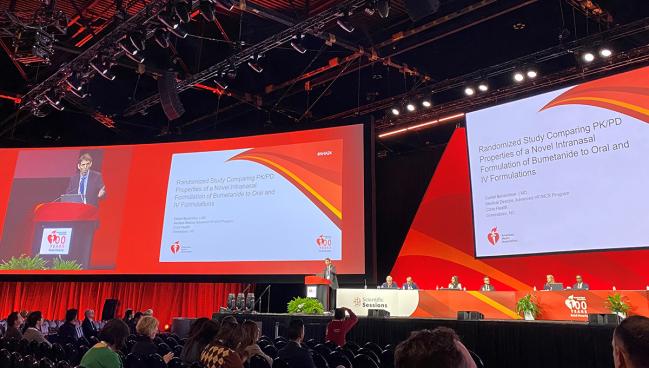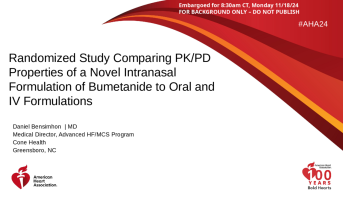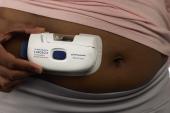Nasal Bumetanide Safe, Effective in Healthy Adults
(UPDATED) A nasal spray would be a workaround for drug resistance seen with oral diuretics, with the potential to reduce hospital visits.

CHICAGO, IL—A novel way of taking the loop diuretic bumetanide—by nasal spray—is safe and well tolerated in healthy adults, according to preliminary randomized data. Diuretic concentrations achieved with the nasal spray were equivalent to those seen with oral and intravenous formulations.
The findings unlock another new avenue by which heart failure patients might self-administer decongestion therapies at home, following positive results from a pilot study published earlier this year with subcutaneous furosemide.
Congestion is the most common driver of heart failure hospitalizations, caused in some cases by resistance to oral diuretics, which require enteral absorption that can be delayed by gut edema, explained investigator Eric Adler, MD (University of California, San Diego), in a press conference at the American Heart Association (AHA) 2024 Scientific Sessions. Even after urgent initiation of IV diuretics in hospital, one in five patients are not completely diuresed by the time of discharge, and one-quarter of these will return to the hospital within 30 days.
“The idea here was to develop a parenteral alternative to [oral and] intravenous diuretics,” he said. “The concept is pretty simple. If we get an intranasal drug, whatever it may be, it acts as a capillary network to systemic circulation and bypasses gastrointestinal and first pass metabolism and gets quickly to our patients.”
Daniel Bensimhon, MD (Cone Health, Greensboro, NC), who presented the late-breaking results today at AHA, quoted prior research showing that two-thirds of heart failure hospitalizations were done simply for the requirement of IV diuretics at a cost of about $17,000 per admission. “Is there a better way to do this? Is there a way to get around diabetic resistance without using intravenous therapies?” he asked.
Discussing the study at the media briefing, Eldrin Lewis, MD (Stanford University, Palo Alto, CA), called it “a promissory note” in that it was well designed but can only imply so much in a population of patients without known heart failure. “It seems that it is safe and well tolerated,” he agreed, adding that the drug holds potential in patients who have “high variability in their diuretic requirements” once they've left hospital, as well as for rescue situations or in patients with diuretic resistance. Loop diuretics, Lewis also noted, are typically delivered via a nebulizer, so a nasal spray could be attractive for patients who would prefer an easier route as well as those who are needle averse.
Commenting on the findings for TCTMD, Carlos Santos-Gallego, MD, PhD (Icahn School of Medicine at Mount Sinai, New York, NY), told TCTMD the trend toward developing formulations of diuretics that bypass the gastrointestinal system is “ingenious and I think it really helps patients.”
For many patients prescribed oral diuretics, “we know they are not going to be super effective, but that's the only thing that we have because we cannot have a patient continuously with an IV at home,” he said. A nasal or subcutaneous drug is not going to be an option for all patients, Santos-Gallego clarified, but for “the minority of patients that have congestion or diuretic resistance or are not responding to oral diuretics, I think this parenteral administration is going to be very effective.”
Safety Shown
For the RSQ-777-02 study, which was simultaneously published as a research letter in Circulation with first author Andrew Ambrosy, MD (Kaiser Permanente, San Francisco, CA), the researchers randomized 68 healthy adults (mean age 39 years; 34% female) in a crossover design to receive bumetanide nasal spray (Corstasis Therapeutics), oral, and IV bumetanide—all given as a 2-mg dose—in one of four different sequences over 10 days. Participants were housed in a research facility for the duration of the study and monitored through daily physical exams, as well as checks on serum and urine electrolyte concentrations.
Investigators saw bioequivalence between oral and nasal bumetanide according to three parameters: maximum concentration, area under the concentration-time curve, and time to maximum concentration (Tmax). Notably, the nasal spray was absorbed more quickly, with a Tmax of 1 hour compared with 1.5 hours with oral bumetanide.
Nasal bumetanide was associated with slightly less urine output compared with IV delivery, but diuresis was equivalent among all three formulations starting at about 2 hours after administration.
Excretion of sodium and potassium were similar for nasal and oral bumetanide, with these values slightly lower for IV treatment. Natriuresis occurred slightly earlier for the nasal spray compared with the IV formulation.
Fewer treatment-emergent adverse events were reported with the nasal spray than with oral bumetanide (16.2% vs 23.9%). The most common events were hypovolemia and headache. Only one patient complained of nasal dryness following administration of the drug.
“Intranasal bumetanide represents a novel, safe, self-administered, parenteral diuretic option for our patients,” Bensimhon concluded, adding that studies of this drug in heart failure patients are forthcoming to see if it can overcome diuretic resistance. “It can help us change our paradigm in our patients who are developing congestion and not responding to their oral diuretic, which is a cause of a lot of morbidity and a lot of costs for our system.”
The focus of future research, he stressed, should not be to determine which therapy is better than another, but rather to ask: “Are we developing therapies that work and can we find therapies that keep patients out of the hospital and lead to better diuretic absorption?”
‘Opens Up the Door’
Though there are several diuretics on the market, Adler said they chose bumetanide “with some intentionality because that's a drug that we commonly use already in oral form. . . . It has a relatively short length of exposure, so it's more convenient for patients that get a lot of diuretic effect in a short period of time. Just for their lifestyle, we think it's a superior choice for our heart failure patients.”
That said, Adler continued, this study “opens up the door to a whole host of therapeutics in the cardiovascular space for nasal administration, though, and we're looking at a number of them.”
Lewis, addressing the choice of diuretic, noted that “torsemide and bumetanide both have similar bioavailabilities between IV and oral forms, so it'll be interesting to look at, say, furosemide, which doesn't, to see whether or not there is equal efficacy.”
There are several other open-ended questions regarding nasal administration, he said. For example, the tolerability might change if a patient uses the spray for multiple doses. “Do you develop the same diuretic resistance that you do with oral diuretics?” Lewis asked, adding that the risk of nasal irritation may also increase with continuous use.
Also, patient-reported outcomes might change with nasal bumetanide. “We have to consider patient preference in everything, particularly as it comes to how to optimize the diuretic availability in these patients,” Lewis said.
Discussing the study during the session, Ravi Patel, MD (Feinberg School of Medicine at Northwestern University, Chicago, IL), said studies of nasal bumetanide in acutely decompensated heart failure patients will be especially important given this population’s need for typically higher doses of diuretics for a cumulatively lower natriuretic effect.
“Today's results offer a critical first step in understanding the role of nasal bumetanide in patients with worsening heart failure to prevent heart failure hospitalizations and improve symptoms,” he said.
Yael L. Maxwell is Senior Medical Journalist for TCTMD and Section Editor of TCTMD's Fellows Forum. She served as the inaugural…
Read Full BioSources
Ambrosy A, Bensimhon D, Kolski B, et al. A randomized study comparing a novel intranasal formulation of bumetanide to oral and intravenous formulations. Circulation. 2024;Epub ahead of print.
Disclosures
- Adler reports being the CMO of Lexeo Therapeutics, holding an equity interest in Rocket Pharmaceuticals, being a founder and holding an equity interest in Papillion, and being a scientific advisor to Corstasis Therapeutics.
- Bensimhon reports receiving consulting and speaker fees from Pfizer/BMS, Janssen, Boehringer Ingelheim/Lilly, Bayer, AstraZeneca, Sensible Medical, scPharmaceuticals, Caption Health, and Zoll-Itamar; serving on the scientific advisory boards for Corstasis and AquaPass; holding stock or equity in scPharmaceuticals and Sensible Medical; and owning/founding Ventricle Health.
- Patel and Santos-Gallego report no relevant conflicts of interest.






Comments